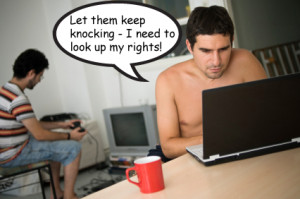*The following is for informational purposes only and does not constitute legal advice. Always speak with an attorney before relying on anything* If your room has been searched in Arkansas, please call 479-782-1125 for a free consultation.
About a year ago we explored the basics of when a police officer can search your dorm room in Arkansas, which you should read before this blog post:
See: Can UAPD Search Your Dorm Room Without Consent?
Within the past couple of years, we have had a lot of success dropping drug/alcohol charges arising out of evidence obtained from a dorm room search. The facts generally go like this:
THE ENTRY:
A police officer is dispatched because a neighbor in the dorm claims to be able to smell marijuana coming from somebody’s room, or there is a noise disturbance, etc. The officer knocks on the door, smells a strong odor of marijuana or alcohol and asks for permission to enter the room. The student agrees and lets the officer come inside. This is when the illegal search occurs. Police officers cannot enter your dorm room without telling you first that you have the right to refuse consent to a search of your residence (unfortunately this doesn’t apply to vehicles).
Some may argue that the smell of burning marijuana creates an exigent circumstance that allows the police to enter the residence out of fear that the evidence (the marijuana) is being destroyed (burned). However, this exact issue has already been decided by the Supreme Court in 1948 in Johnson v. U.S., where police searched a hotel room without a warrant because an officer could smell burning opium. (I have provided the entire case in full at the bottom of this blog). This is an old case, and it has been treated negatively 77 times by the courts, but it has been cited 3,054 times. In those 77 cases treating Johnson negatively, the facts never distinguished the exigent circumstances regarding the burning of evidence, and so that holding stands true to this day.
THE ADMISSION
After being allowed inside the room, the officer asks the student if they have been smoking any illegal drugs. The student breaks down and admits to being under 21, being drunk, and by the way here is all of my marijuana and my pipe. The officer then charges the student with minor in possession of alcohol for possessing alcohol in his system, possession of a controlled substance, and possession of drug paraphernalia.
However, even this admission will not be allowed in court because the defendant was not read his Miranda Warnings:
“You have the right to remain silent and refuse to answer questions.
Anything you say may be used against you in a court of law.
You have the right to consult an attorney before speaking to the police and to have an attorney present during questioning now or in the future.
If you cannot afford an attorney, one will be appointed for you before any questioning if you wish.
If you decide to answer questions now without an attorney present, you will still have the right to stop answering at any time until you talk to an attorney.
Knowing and understanding your rights as I have explained them to you, are you willing to answer my questions without an attorney present?”
Now, if a police officer doesn’t give you your Miranda Warnings when you’ve been pulled over for a traffic infraction, that isn’t necessarily against the law because Miranda doesn’t typically apply in those scenarios, but that is the topic for another post.
For more general advice as to your rights and dorm room searches, I’d suggest reading this post by another attorney: http://www.grahamlawyerblog.com/2011/05/15/searches-of-dorm-rooms-your-rights-as-a-college-student-tips-from-a-criminal-defense-lawyer/ My advice will be slightly different, as the University of Arkansas does not allow for searches of your residence, only for staff to enter the residence. See their sample contract for clarity:
http://housing.uark.edu/Contracting/ContractHousing2015-2016SAMPLE.pdf
In conclusion, if your particular circumstance fits into the scenarios outlined above, know that you have rights and that we urge you to exercise them. If you believe you have been treated unfairly because you have been subjected to an illegal search of your dorm room by police, or because you were not properly advised of your right to remain silent, contact our office. These matters are time sensitive, so do not hesitate to contact a knowledgeable attorney who can help you.
Relevant case law: Johnson v. United States, 333 U.S. 10, 11-17, 68 S. Ct. 367, 368-71, 92 L. Ed. 436 (1948)
Mr. Justice JACKSON delivered the opinion of the Court. Petitioner was convicted on four counts charging violation of federal narcotic laws.1 The only question which brings the case here is whether it was lawful, without a warrant of any kind, to arrest petitioner and to search her living quarters. *12 Taking the Government’s version of disputed events, decision would rest on these facts:At about 7:30 p.m. Detective Lieutenant Belland, an officer of the Seattle police force narcotic detail, received information from a confidential informer, who was also a known narcotic user, that unknown persons were smoking opium in the Europe Hotel. The informer was taken back to the hotel to interview the manager, but he returned at once saying he could smell burning opium in the hallway. Belland communicated with federal narcotic agents and between 8:30 and 9 o’clock went back to the hotel with four such agents. All were experienced in narcotic work and recognized at once a strong odor of burning opium which to them was distinctive and unmistakable. The odor led to Room 1. The officers did not know who was occupying that room. They knocked and a voice inside asked who was there. ‘Lieutenant Belland,’ was the reply. There was a slight delay, some ‘shuffling or noise’ in the room and then the defendant opened the door. The officer said, ‘I want to talk to you a little bit.’ She then, as he describes it, ‘stepped back acquiescently and admitted us.’ He said, ‘I want to talk to you about the opium smell in the room here.’ She denied that there was such a smell. Then he said, ‘I want you to consider yourself under arrest because we are going to search the room.’ The search turned up incriminating opium and smoking apparatus, the latter being warm, apparently from recent use. This evidence the District Court refused to suppress before trial and admitted over defendant’s objection at the trial. Conviction resulted and the Circuit Court of Appeals affirmed.2The defendant challenged the search of her home as a violation of the rights secured to her in common with others, by the Fourth Amendment to the Constitution. *13 The Government defends the search as legally justifiable, more particularly as incident to what it urges was a lawful arrest of the person.I.The Fourth Amendment to the Constitution of the United States provides:‘The right of the people to be secure in their persons, houses, papers, and effects, against unreasonable searches and seizures, shall not be violated, and no Warrants shall issue, but upon probable cause, supported by Oath or affirmation, and particularly describing the place to be searched, and the persons or things to be seized.’1 Entry to defendant’s living quarters, which was the beginning of the search, was demanded under color of office. It was granted in submission to authority rather than as an understanding and intentional waiver of a constitutional right. Cf. Amos v. United States, 255 U.S. 313, 41 S.Ct. 266, 65 L.Ed. 654.2 At the time entry was demanded the officers were possessed of evidence which a magistrate might have found to be probable cause for issuing a search warrant. We cannot sustain defendant’s contention, erroneously **369 made, on the strength of Taylor v. United States, 286 U.S. 1, 52 S.Ct. 466, 76 L.Ed. 951, that odors cannot be evidence sufficient to constitute probable grounds for any search. That decision held only that odors alone do not authorize a search without warrant. If the presence of odors is testified to before a magistrate and he finds the affiant qualified to know the odor, and it is one sufficiently distinctive to identify a forbidden substance, this Court has never held such a basis insufficient to justify issuance of a search warrant. Indeed it might very well be found to be evidence of most persuasive character.34 The point of the Fourth Amendment, which often is not grasped by zealous officers, is not that it denies law enforcement *14 the support of the usual inferences which reasonable men draw from evidence. Its protection consists in requiring that those inferences be drawn by a neutral and detached magistrate instead of being judged by the officer engaged in the often competitive enterprise of ferreting out crime.3 Any assumption that evidence sufficient to support a magistrate’s disinterested determination to issue a search warrant will justify the officers in making a search without a warrant would reduce the Amendment to a nullity and leave the people’s homes secure only in the discretion of police officers.4 Crime, even in the privacy of one’s own quarters, is, of course, of grave concern to society, and the law allows such crime to be reached on proper showing. The right of officers to thrust themselves into a home is also a grave concern, not only to the individual but to a society which chooses to dwell in reasonable security and freedom from surveillance. When the right of privacy must reasonably yield to the right of search is, as a rule, to be decided by a judicial officer, not by a policeman or Government enforcement agent.5 There are exceptional circumstances in which, on balancing the need for effective law enforcement against the *15 right of privacy, it may be contended that a magistrate’s warrant for search may be dispensed with. But this is not such a case. No reason is offered for not obtaining a search warrant except the inconvenience to the officers and some slight delay necessary to prepare papers and present the evidence to a magistrate. These are never very convincing reasons and, in these circumstances, certainly are not enough to bypass the constitutional requirement. No suspect was fleeing or likely to take flight. The search was of permanent premises, not of a movable vehicle. No evidence or contraband was threatened with removal or destruction, except perhaps the fumes which we suppose in time will disappear. But they were not capable at any time of being reduced to possession for presentation to court. The evidence of their existence before the search was adequate and the testimony of the officers to that effect would not perish from the delay of getting a warrant.If the officers in this case were excused from the constitutional duty of presenting their evidence to a magistrate, it is difficult to think of a case in which it should be required.II.678 The Government contends, however, that this search without warrant **370 must be held valid because incident to an arrest. This alleged ground of validity requires examination of the facts to determine whether the arrest itself was lawful. Since it was without warrant, it could be valid only if for a crime committed in the presence of the arresting officer or for a felony of which he had reasonable cause to believe defendant guilty.5 *16 The Government, in effect, concedes that the arresting officer did not have probable cause to arrest petitioner until he had entered her room and found her to be the sole occupant.6 It points out specifically, referring to the time just before entry, ‘For at that time the agents did not know whether there was one or several persons in the room. It was reasonable to believe that the room might have been an opium smoking den.’ And it says, ‘* * * that when the agents were admitted to the room and found only the petitioner present they had a reasonable basis for believing that she had been smoking opium and thus illicitly possessed the narcotic.’ Thus the Government quite properly stakes the right to arrest, not on the informer’s tip and the smell the officers recognized before entry, but on the knowledge that she was alone in the room, gained only after, and wholly by reason of, their entry of her home. It was therefore their observations inside of her quarters, after they had obtained admission under color of their police authority, on which they made the arrest.79 Thus the Government is obliged to justify the arrest by the search and at the same time to justify the search by *17 the arrest. This will not do. An officer gaining access to private living quarters under color of his office and of the law which he personifies must then have some valid basis in law for the intrusion. Any other rule would undermine ‘the right of the people to be secure in their persons, houses, papers and effects,’8 and would obliterate one of **371 the most fundamental distinctions between our form of government, where officers are under the law, and the police-state where they are the law.Reversed.The CHIEF JUSTICE, Mr. Justice BLACK, Mr. Justice REED and Mr. Justice BURTON dissent.All Citations333 U.S. 10, 68 S.Ct. 367, 92 L.Ed. 436Footnotes1Two counts charged violation of s 2553(a) of the Internal Revenue Code, 26 U.S.C. s 2553(a), 26 U.S.C.A. Int.Rev.Code, s 2553(a), and two counts charged violation of the Narcotic Drugs Import and Export Act, as amended, 21 U.S.C. s 174, 21 U.S.C.A. s 174.29 Cir., 162 F.2d 562.3In United States v. Lefkowitz, 285 U.S. 452, 464, 52 S.Ct. 420, 423, 76 L.Ed. 877, 82 A.L.R. 775, this Court said: ‘* * * the informed and deliberate determinations of magistrates empowered to issue warrants as to what searches and seizures are permissible under the Constitution are to be preferred over the hurried action of officers and others who may happen to make arrests. Security against unlawful searches is more likely to be attained by resort to search warrants than by reliance upon the caution and sagacity of petty officers while acting under the excitement that attends the capture of persons accused of crime. * * *’4‘Belief, however well founded, that an article sought is concealed in a dwelling house, furnishes no justification for a search of that place without a warrant. And such searches are held unlawful notwithstanding facts unquestionably showing probable cause.’ Agnello v. United States, 269 U.S. 20, 33, 46 S.Ct. 4, 6, 70 L.Ed. 145, 51 A.L.R. 409.5This is the Washington law. State v. Symes, 20 Wash. 484, 55 P. 626; State v. Lindsey, 192 Wash. 356, 73 P.2d 738; State v. Krantz, 24 Wash.2d 350, 164 P.2d 453; State v. Robbins, 25 Wash.2d 110, 169 P.2d 246. State law determines the validity of arrests without warrant. United States v. Di Re, 332 U.S. 581, 68 S.Ct. 222.6The Government brief states that the question presented is ‘whether there was probable cause for the arrest of petitioner for possessing opium prepared for smoking and the search of her room in a hotel incident thereto for contraband opium, where experienced narcotic agents unmistakably detected and traced the pungent, identifiable odor of burning opium emanating from her room and knew, before they arrested her, that she was the only person in the room.’7The Government also suggests that ‘In a sense, the arrest was made in ‘hot pursuit’. * * *‘ However, we find no element of ‘hot pursuit’ in the arrest of one who was not in flight, was completely surrounded by agents before she knew of their presence, who claims without denial that she was in bed at the time, and who made no attempt to escape. Nor would these facts seem to meet the requirements of the ‘Washington Uniform Law on Fresh Pursuit.’ Session Laws 1943, ch. 261.8In Gouled v. United States, 255 U.S. 298, 302, 303, 41 S.Ct. 261, 263, 65 L.Ed. 647, this Court said: ‘It would not be possible to add to the emphasis with which the framers of our Constitution and this court (in Boyd v. United States, 116 U.S. 616, 6 S.Ct. 524, 29 L.Ed. 746, in Weeks v. United States, 232 U.S. 383, 34 S.Ct. 341, 58 L.Ed. 652, L.R.A.1915B, 834, Ann.Cas.1915C, 1177, and in Silverthorne Lumber Co. v. United States, 251 U.S. 385, 40 S.Ct. 182, 64 L.Ed. 319 (24 A.L.R. 1426)) have declared the importance to political liberty and to the welfare of our country of the due observance of the rights guaranteed under the Constitution by these two (Fourth and Fifth) Amendments. The effect of the decisions cited is: That such rights are declared to be indispensable to the ‘full enjoyment of personal security, personal liberty, and private property’; that they are to be regarded as of the very essence of constitutional liberty; and that the guaranty of them is as important and as imperative as are the guaranties of the other fundamental rights of the individual citizen—the right to trial by jury, to the writ of habeas corpus, and to due process of law. It has been repeatedly decided that these amendments should receive a liberal construction, so as to prevent stealthy encroachment upon or ‘gradual depreciation’ of the rights secured by them, by imperceptible practice of courts or by well-intentioned, but mistakenly overzealous, executive officers.’






